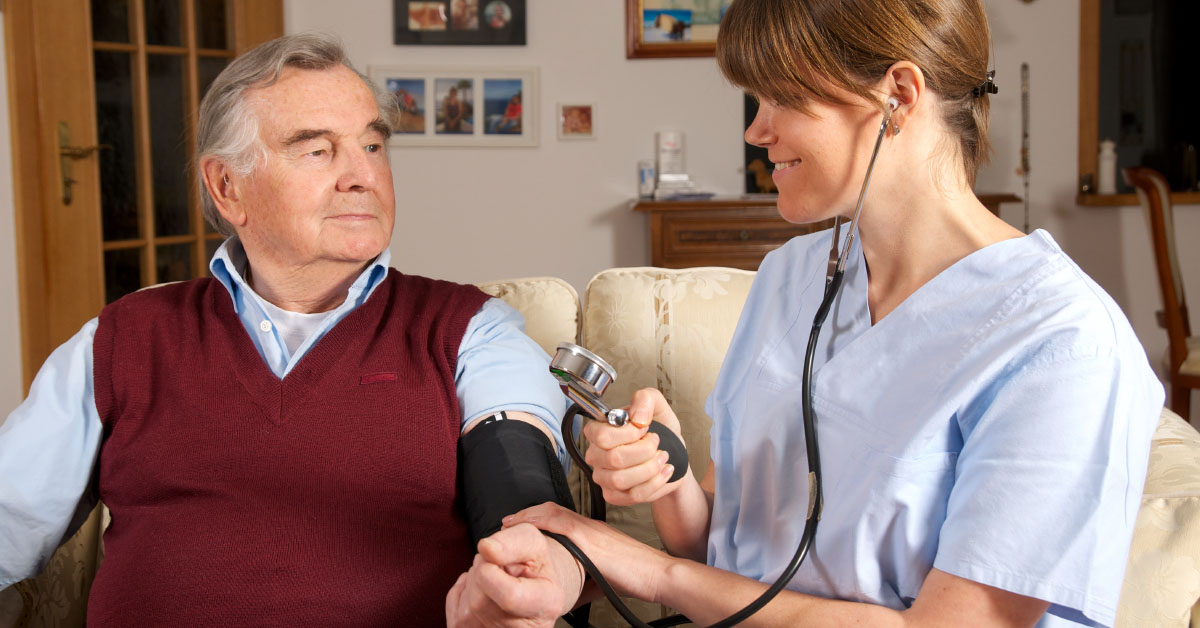
Feel Depressed? Comfort Foods May Worsen the Problem.
Studies published last March in the Journal of the American Medical Association (JAMA) shed new light on the depression – diet connection. Depression ranks as a major national health burden, but, among home care patients, the symptoms become even more problematic. Major depression proves twice as common among patients receiving home health care.1 Authors cite social isolation, cognitive challenges, and recent physical health problems as likely contributing factors. Beyond the depression itself, depression symptoms interfere with patients’ ability or willingness to implement their own care plans. Therefore, treating depression effectively concerns home care providers even more than most healthcare providers.
The Connection Between Depression and Obesity
Scientists have long known that depressed people experience higher risk of obesity. Similarly, research shows obesity causes depression. Therefore, the two conditions commonly co-occur. Moreover, they cause and worsen each other in a vicious cycle.2 Among people who have depressive symptoms (but not major depression) and who are overweight, roughly 10% will have major depressive disorder within a year.3 Nevertheless, formal treatment programs addressing both weight and depression simultaneously have not been well established. In fact, clinicians have criticized attempts to integrate therapies as body shaming and discrimination.
How Common Is Obesity?
Research suggests that more than 160 million Americans are overweight or obese. In America, more than 60% of women and nearly 75% of men weigh in above the desired range.4 The high prevalence of struggles with weight suggests that many people could, theoretically, benefit from programs that simultaneously address depression and diet.
A First-of-Its-Kind Trial
Last March, JAMA published a depression treatment trial that in some ways was the first of its kind. They dubbed the experiment the RAINBOW trial.5 Researchers recruited over 400 overweight adults with depressive symptoms. Half received normal care. The other half received normal medical care plus a behavioral weight loss treatment program focusing on diet and activity. Patients who received weight loss coaching simultaneously with their medical care both achieved more weight loss and improved results with depressive symptoms. In fact, patients in the combined treatment program proved more than twice as likely to achieve greater than 50% improvement in depressive symptoms.
Lead author Jun Ma, PM, PhD, describes the study as the first one to integrate a weight loss treatment with depression treatment and test the results. The RAINBOW trial achieves another first in that treatments were delivered in primary care settings, making the trial the first of its kind to demonstrate effective integrated care can be delivered without referral to specialists.
Problems with the RAINBOW Trial
The results of this trial are somewhat complicated by the fact that doctors in the experimental group prescribed antidepressants at higher rates than doctors in the usual care group. However, a recent meta-analysis combines multiple studies and concludes that dietary interventions, as adjuncts to standard care, reduce depressive symptoms.6 It is likely that the diet and exercise interventions were causal in this study. The RAINBOW trial provides new encouragement that, with a little orientation, primary care practitioners can provide more effective depression treatment by integrating certain strategies to help with weight.
It May Be Diet, Not Weight
Many of these studies focus on body weight, but authors question whether that’s the right focus.7 Is it the weight loss or the diet and exercise that improves depression? In the RAINBOW trial, participants in the weight loss intervention only decreased their weight 2%. With their body mass index (BMI) dropping from 36.7 to 35.9, on average, they were still obese. Is that really enough movement toward the desired BMI range of 18 – 25 to make a difference?
Previously, the Be Active Trial gave a diet improvement intervention to overweight people with depressive symptoms.8 They found that the intervention improved depressive symptoms even though body weight did not improve. Similarly, the SMILES trial focused on diet improvement, not weight change.9 Those researchers found that diet improvement positively affected depressive symptoms, even in the absence of any significant weight change.
Depression and Home Health
Home health patients present particular risk for depression. Compared to matched patients who are not homebound, they prove twice as likely to experience depression. This depression interferes with a patient’s willingness to participate in care. The problem is so important that Medicare checks to see if home health agencies screen all patients for depression. Medicare reports the results publicly in Home Health Compare, a short list of the most important quality indicators in home health. Fortunately, home health agencies are skilled in whole-patient care, medication adherence coaching, diet coaching, and teaching other lifestyle modifications relevant to disease management. Agencies will be well prepared to add diet and exercise interventions specifically designed to target depressive symptoms.
The Takeaway for the Rest of Us
Combined interventions are not the norm in usual care. Most people who are both overweight and struggling with depression, a common combination, are not home health patients. It may be helpful to ask doctors for the best, local programmatic lifestyle interventions promoting smoking cessation, physical activity, and diet quality. When added to usual care, these interventions have been found cost-effective at improving depression.10,11
References:
- Bruce ML, McAvay GJ, Raue PJ, Brown EL, Meyers BS, Keohane DJ, Jagoda DR, Weber C. Major depression in elderly home health care patients. American Journal of Psychiatry. 2002 Aug 1;159(8):1367-74.
- Milaneschi Y, Simmons WK, Rossum EF, Penninx BW. Depression and obesity: evidence of shared biological mechanisms. Molecular Psychiatry. 2018 Feb 16:1.
- Bot M, Brouwer IA, Roca M, Kohls E, Penninx BW, Watkins E, van Grootheest G, Cabout M, Hegerl U, Gili M, Owens M. Effect of multinutrient supplementation and food-related behavioral activation therapy on prevention of major depressive disorder among overweight or obese adults with subsyndromal depressive symptoms: the MooDFOOD randomized clinical trial. JAMA. 2019 Mar 5;321(9):858-68.
- Ng M, Fleming T, Robinson M, Thomson B, Graetz N, Margono C, Mullany EC, Biryukov S, Abbafati C, Abera SF, Abraham JP. Global, regional, and national prevalence of overweight and obesity in children and adults during 1980–2013: a systematic analysis for the Global Burden of Disease Study 2013. The Lancet. 2014 Aug 30;384(9945):766-81.
- Ma J, Rosas LG, Lv N, Xiao L, Snowden MB, Venditti EM, Lewis MA, Goldhaber-Fiebert JD, Lavori PW. Effect of integrated behavioral weight loss treatment and problem-solving therapy on body mass index and depressive symptoms among patients with obesity and depression: the RAINBOW randomized clinical trial. JAMA. 2019 Mar 5;321(9):869-79.
- Firth J, Marx W, Dash S, Carney R, Teasdale SB, Solmi M, Stubbs B, Schuch FB, Carvalho AF, Jacka F, Sarris J. The effects of dietary improvement on symptoms of depression and anxiety: a meta-analysis of randomized controlled trials. Psychosomatic Medicine. 2019 Mar 26.
- Berk M, Jacka FN. Diet and Depression—From Confirmation to Implementation. JAMA. 2019 Mar 5;321(9):842-3.
- Pagoto S, Schneider KL, Whited MC, Oleski JL, Merriam P, Appelhans B, Ma Y, Olendzki B, Waring ME, Busch AM, Lemon S. Randomized controlled trial of behavioral treatment for comorbid obesity and depression in women: The Be Active Trial. International Journal of Obesity. 2013 Nov;37(11):1427.
- Jacka FN, O’Neil A, Opie R, Itsiopoulos C, Cotton S, Mohebbi M, Castle D, Dash S, Mihalopoulos C, Chatterton ML, Brazionis L. A randomised controlled trial of dietary improvement for adults with major depression (the ‘SMILES’trial). BMC Medicine. 2017 Dec;15(1):23.
- Chatterton ML, Mihalopoulos C, O’Neil A, Itsiopoulos C, Opie R, Castle D, Dash S, Brazionis L, Berk M, Jacka F. Economic evaluation of a dietary intervention for adults with major depression (the “SMILES” trial). BMC Public Health. 2018 Dec;18(1):599.
- Segal L, Twizeyemariya A, Zarnowiecki D, Niyonsenga T, Bogomolova S, Wilson A, O’Dea K, Parletta N. Cost effectiveness and cost-utility analysis of a group-based diet intervention for treating major depression–the HELFIMED trial. Nutritional Neuroscience. 2018 Dec 14:1-9.






